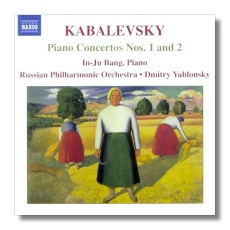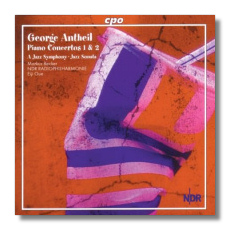
The Internet's Premier Classical Music Source
Related Links
- Latest Reviews
- More Reviews
-
By Composer
-
Collections
DVD & Blu-ray
Books
Concert Reviews
Articles/Interviews
Software
Audio
Search Amazon
Recommended Links
Site News
 CD Review
CD Review
20th-Century Piano Concertos

Dmitri Kabalevsky
- Piano Concerto #1
- Piano Concerto #2
In-Ju Bang, piano
Russian Philharmonic Orchestra/Dmitry Yablonsky
Naxos 8.557683


George Antheil
- Piano Concerto #1
- Piano Concerto #2
- A Jazz Symphony
- Jazz Sonata
- Can-Can
- Sonatina for Radio
- Sonatina "Death of Machines"
- Little Shimmy
Markus Becker, piano
NDR Radio Philharmonic Orchestra/Eije Oue
CPO 777109-2 65:38
These are two very interesting discs, both 'musts' for those with an interest in 20th-century piano music off the beaten path. Kabalevsky's Second Concerto has nearly been on the beaten path several times, but of late it's been rather neglected. In the mid-1970s, on the Columbia Special Products label, Ozan Marsh made a recording of the work, then newly revised (1973) by the composer, with the Royal Philharmonic Orchestra, led by Paul Freeman. It was a good effort, as is this new one by Korean pianist In-Ju Bang. She plays both concertos cleanly and with spirit and commitment. It would be hard to imagine better performances by even some of the finest Russian pianists today. That's saying a lot, of course, not least because Ms. Bang was a mere fourteen-year-old when she recorded these concertos in December, 2004. Dmitry Yablonsky and the Russian Philharmonic provide fine support throughout, too, and Naxos offers vivid sound.
But, you ask, what of the music? To me, both concertos are solidly-crafted, with the Second the better of the pair. Both are cast in three movements, with the First, at just over a half-hour, running six or seven minutes longer than the more tersely-argued Second. They are tuneful works, sounding more like Rachmaninoff than Prokofieff, though some listeners hear a nearly equal balance of influence by those two iconic Russian composers. In the end, I would say they are better works than many of these rediscovered concertos one finds popping up on various labels today. Yet, they don't quite reach the levels of the better piano concertos of the 20th-century by Prokofieff, Rachmaninoff and Bartók.
The Antheil concertos, as the notes by the always insightful Eckhardt van den Hoogen point out, clearly show the influence of Stravinsky, but much of the Pétrouchka-flavored music in the First has a folkish, Hungarian sound, a Bartókian sound, in fact. The single-movement First is also the brasher of the two concertos – and those who know Antheil know he can be quite brash. Yet, neither concerto breaks any sacred conventions, though they are consistently colorful and divulge fine writing for the piano. I would say the Second, cast in three movements, is the better-crafted of the two. Those listeners seeking somewhat adventurous, bolder music will likely favor this pair of works over the more conservative Kabalevsky two. Each lasts about twenty minutes and is brilliantly performed by pianist Markus Becker. Eiji Oue and the NDR Radio Philharmonic provide excellent support and cpo's sound is clear and balanced.
The other works on the disc are generally light and comical, with A Jazz Symphony irresistible in its sheer goofiness, its off-kilter, sometimes oafish bounciness, its Ivesian spirit, and its vivid, rich colors. It features a prominent piano part, by the way, though the orchestra holds sway throughout most of the work. The remaining items here are for solo piano. Jazz Sonata is a nearly two-minute piece of catchy fluff, while the five-minute Can-Can is, like A Jazz Symphony, a whacky, colorful piece that will make you wonder why it isn't more popular. Sonatina, at nearly four-and-a-half minutes, recalls Prokofieff from his slightly arid French period, but exhibits a light, springy touch, especially in the latter half. Death of Machines (really the composer's Sonata #3) lasts a mere three minutes and is the most difficult piece for the listener here. Still, it's quite rhythmic and colorful and eventually turns irresistibly mischievous in its heavy doses of dissonance. Little Shimmy is two minutes of intriguing music that seems to mix Prokofieff and Gershwin.
There you have it. Both discs can easily be recommended, especially if the repertory appeals to you.
Copyright © 2006, Robert Cummings




















